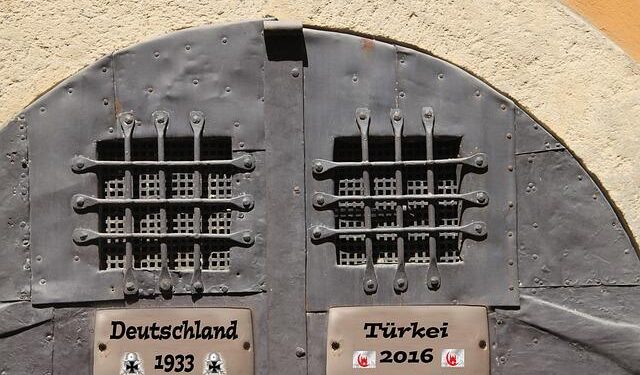Turkish President Recep Tayyip Erdońüan has reaffirmed his commitment to a two-state solution for Cyprus, emphasizing the need for a fresh approach to resolve the decades-long division of the island. Speaking amid ongoing tensions and stalled negotiations, Erdońüan’s remarks underscore Turkey’s continued support for the establishment of separate Greek Cypriot and Turkish Cypriot states, a stance that contrasts with the internationally backed goal of reunification. This latest declaration was reported by ekathimerini.com, highlighting the persistent challenges facing efforts to achieve a comprehensive settlement in Cyprus.
Erdogan Emphasizes Commitment to Two-State Solution in Cyprus Dispute
President Recep Tayyip Erdogan has once again underscored Turkey’s unwavering stance on the Cyprus issue, reiterating support for a two-state solution. Speaking at a recent diplomatic forum, Erdogan emphasized that any resolution must recognize the sovereignty and equal status of the Turkish Cypriot community alongside the Greek Cypriots. According to Erdogan, past negotiations have failed due to the insistence on a unitary federal model, which does not address the realities on the ground. The Turkish leader stressed that Ankara remains committed to a peaceful process but insists on firm guarantees to protect the rights and security of Turkish Cypriots.
The renewed declaration comes amid fresh tensions in the Eastern Mediterranean, where competing claims over energy exploration and territorial waters have complicated efforts at reconciliation. Experts note that Erdogan’s position challenges previous international diplomatic frameworks and highlights Turkey’s strategic interests in Cyprus. Below is a quick comparison of the key differences between the two main proposed solutions, outlining the core points Erdogan addressed:
| Aspect | Two-State Solution | Federal Solution |
|---|---|---|
| Governance | Separate sovereign states | One federation with shared governance |
| Security | Mutual guarantees, separate armies | Joint security arrangements |
| Property Rights | Independent control by each side | Integrated property laws |
| International Recognition | Separate recognition | One internationally recognized state |
- Equal sovereignty for Turkish and Greek Cypriots
- Security guarantees to protect minority rights
- Opposition to federated framework viewed as ineffective
Analysis of Political Implications for Cyprus Peace Talks and Regional Stability
Erdogan’s reiteration of a two-state solution for Cyprus marks a significant shift in the geopolitical conversation surrounding the island, complicating years of diplomatic efforts aimed at reunification. This stance effectively challenges the long-standing framework endorsed by the United Nations, which favors a bi-communal federal structure. The renewed emphasis on two sovereignties threatens to deepen divisions between the Greek Cypriot south and the Turkish Cypriot north, potentially derailing ongoing peace negotiations.
The ripple effects extend beyond the island, impacting overall regional stability in the Eastern Mediterranean. Key consequences include:
- Heightened tensions between Turkey and Greece, both NATO members with competing interests in maritime boundaries.
- Strained relations with EU states, as Cyprus remains an EU member and Erdogan’s stance tests Brussels’ diplomatic patience.
- Increased security risks stemming from potential military buildups on both sides of the island.
| Stakeholder | Position | Potential Impact |
|---|---|---|
| Turkey | Supports two-state solution | Consolidates control over North Cyprus |
| Greek Cyprus | Opposes division, favors reunification | Political isolation risks grow |
| Turkey | Supports two-state solution | Consolidates control over North Cyprus |
| Greek Cyprus | Opposes division, favors reunification | Political isolation risks grow |
| European Union | Supports UN-backed federal solution | Strained diplomatic relations with Turkey |
| Greece | Opposes two-state solution; supports Greek Cypriot position | Increased maritime disputes; heightened military alertness |
| United Nations | Advocates bi-communal federation | Peace process at risk; requires renewed mediation efforts |
| Stakeholder Role | Priority Actions |
|---|---|
| United Nations | Facilitate mediation & peacekeeping efforts |
| European Union | Provide economic incentives & political backing |
| Neighboring Countries | Support bilateral dialogue and regional stability |
| NGOs & Civil Society | Advance grassroots reconciliation programs |
Insights and Conclusions
As tensions persist over the Cyprus issue, President Erdońüan’s reaffirmation of a two-state solution underscores the continuing divergence between Turkish and Greek Cypriot positions. With international stakeholders closely monitoring developments, the path toward a mutually acceptable resolution remains uncertain, highlighting the complexities that have long defined the island’s division.
















